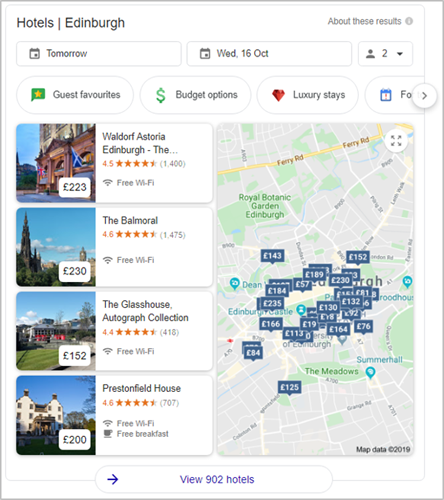
Commonly misunderstood, Google’s local search algorithm is a beast unto itself and performs very differently from its counterpart, the organic search algorithm. The local algorithm refers to everything that comes together to form the ‘three/four-pack’. These are the top results that are shown to you when you do a search Google deems is of local intent, also known as Google My Business listings or Google Maps listings. See below for an example.
There are three consistent key factors widely regarded as important within the local search algorithm: distance, prominence and relevance. We will explore how each of these is broken down and how they relate to one another to form the local algorithm.

1. DISTANCE
Distance is determined by your location when you make your search as defined by the device that you are using, whether it be mobile, tablet or desktop. Google will normally show you where it thinks you are searching from if you scroll down to the bottom of your screen:

Desktop
Most of us often assume that Google can generally tell which city we are in, however this is actually false and Google can usually know our location at a more granular level. If you are using a desktop then, generally, Google will be able to tell which postcode you are searching from based on your Wi-Fi or Internet connection. You can see which postcode Google thinks you are in at the bottom of the search results page as shown in the above screenshot.
Mobile
However, when you are searching from a mobile device Google is able to get even more accurate location information. This is through the use of geo coordinates which Google can use to pinpoint a user with a higher level of accuracy. You can normally see your location according to Google marked as a little blue dot in maps.
In order to accurately reflect what customers are seeing you will need to know which location level is relevant to your business and industry. If you work in an industry where there are a lot of similar businesses condensed into a small area, such as restaurants, then you will need to pay particular attention to geo coordinates. This is the same for both hotels and spas, unless your business is very rural where it may be more appropriate to look at a postcode level.
Proximity is arguably the most influential factor within the local algorithm in determining search results.
2. PROMINENCE
Prominence is effectively how important Google thinks your business is in the offline world; some businesses are more prominent than others which Google tries to reflect in its results.
Google also determines the prominence of your business by looking at factors from across the web that are key to a strong digital marketing strategy. A couple of different areas that Google takes into account are:
- Links – Whether from articles across the web or from people posting about your business on social media, the more genuine links your business receives the better.
- Store visits – If your business has a physical location and you get no foot traffic then Google will likely lower your prominence.
- Reviews – Review count is a very important factor here, as well as the number of positive reviews a listing is receiving. It is also important to respond to your reviews to show to Google that the listing is active.
- Citations – Having a high number of citations can also factor into the prominence of a listing.
- On-page SEO – Google will also take into account your on-page SEO, such as content, title tags and meta descriptions or structured data when deciding your prominence.
3. RELEVANCE
In simplified terms this is how related Google thinks that your listing is to a specific search query. While your business itself may be relevant it is crucial to ensure that your online presence supports your relevancy. For example, if you have little to no content on your page or if your content is structured poorly then it will lower your relevance score and limit exposure.
How can you increase your relevance?
- Local listing signals – optimising your listing, category selection, business description etc.
- On-page signals – content, title tags, alt text, internal linking, structure data / schema etc.
- Off-page signals – guest posting, 10x content pieces etc.
IMPROVING YOUR LOCAL RANKINGS
One of the best ways to improve your local ranking is to regularly keep your listings up to date to show Google that you’re still active and present.
In summary, it’s important to remember to;
- Enter complete data
- Verify your location(s)
- Keep your hours accurate
- Manage and respond to reviews
- Add photos
Finally, a remember that anyone can “suggest an edit” to your listing to it’s important to review these on a regular basis so that Google doesn’t automatically apply these edits.







